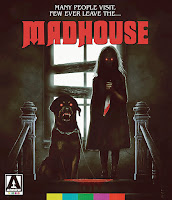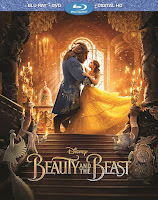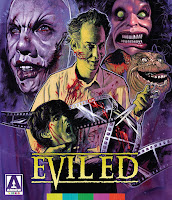- Details
-
Parent Category: Film and the Arts
-
Category: Reviews
-
Published on Wednesday, 14 June 2017 01:36
-
Written by Kevin Filipski
Blu-rays of the Week
The Ballad of Cable Hogue
(Warner Archive)
Sam Peckinpah’s 1970 follow-up to his violent masterpiece The Wild Bunch was this often comedic character study of the fiercely independent Cable Hogue’s Old West travails, including a pair of outlaws who are his arch enemies and a “ladiest damn’d lady” he falls for. The material is weak, and Peckinpah dawdles too often throughout an already overlong two-hour running time, but Jason Robards is always worth watching, and the top-notch supporting cast includes Strother Martin, Slim Pickens, David Warner and Stella Stevens. There’s a first-rate hi-def transfer; extras are a commentary and a vintage Stevens featurette.
The Blood of Fu Manchu/The Castle of Fu Manchu
(Blue Underground)
By the time of these fairly bland horror hybrids (1968-9), Christopher Lee was already an established name in schlocky B-movies, and he does provide both of these diffuse melodramatic thrillers with their liveliest moments. Director Jess Franco would also find better mixes of blood, thrills and scantily-clad women in his later movies, but he at least enlivens Castle with his unhinged appearance in front of the camera. Both films have solid if uneven hi-def transfers; extras are archival interviews with Franco, Lee and others.
The Lego Batman Movie
(Warner Bros)
If mindless animated movies are your thing, then this sequel to the surprising smash Lego Movie might just be the ticket. True, there are scattered amusing visual jokes amidst the mainly groaning puns and punch lines and in-jokes, but did it really take five writers to cobble this together? The ace voice work of Will Arnett, Michael Cera, Ralph Fiennes, Zach Galifianakis and Rosario Dawson provides most of the fun throughout The Blu-ray looks quite good; extras include deleted scenes, featurettes and new animated shorts.
Madhouse
(Arrow)
This unsettling horror yarn about a young woman being tortured by her own insane twin sister, who is preparing a feast for our unsuspecting heroine. There’s a certain cleverness to director Ovidio Assonitis’s cinematic madness, and shooting in Savannah, Georgia makes it less remote and more plausible, despite its many deficiencies. Kudos to Trish Everly, who gives an effectively understated performance in the lead role. The hi-def transfer is excellent; extras include new interviews, an audio commentary and alternate opening titles.
Ugetsu
(Criteron)
Near the end of his long career, Japanese director Kenji Mizoguchi made this elegant-looking 1953 ghost story that’s considered one of his best films, its relative brevity (97 minutes) synthesizing his art down to its very essence. The usual gliding camerawork and sumptuous visual design are brought to the forefront by Criterion’s magnificent hi-def transfer. Extras comprise an appreciation by director Masahiro Shinoda; interviews with the film’s assistant director and cinematographer; commentary by Japanese film expert Tony Rayns; and Kaneto Shindo’s 1975 documentary Kenji Mizoguchi: The Life of a Film Director.
A United Kingdom
(Fox)
In this sturdily earnest biopic, Rosamund Pike and David Oyelowo give genuinely lived-in portrayals of a white English woman and king of the African nation of Botswana who fall in love during the racist era of the 1940s. Director Amma Asante keeps things straightforward, but this story remains at a certain remove, and it’s not until the real people are shown at the end that we are truly moved, despite Pike and Oyelowo’s fine work. The film does look splendid on Blu; extras are several featurettes.
Vision Quest
The Gumball Rally
(Warner Archive)
In 1985’s Vision Quest, the gifted Matthew Modine evokes real sympathy as a high school wrestler who falls for his father’s boarder (Linda Fiorentino) in an intermittently entertaining would-be romance with a decent mid-‘80s soundtrack (Sammy Hagar, Don Henley, Dio) that hits its nadir when Madonna (as a bar singer) warbles her hit “Crazy for You.” Both films have fine hi-def transfers. Made in 1976 during the mid-‘70s/early ‘80s car-race mini-genre (including Death Race 2000 and Cannonball Run), Gumball is distinguished mainly for its lack of star wattage—only Michael Sarrazin and Gary Busey are noticeable to most viewers—and for its gritty camerawork in the deserted streets of Manhattan at the beginning of its cross-country race.
DVDs of the Week
Alone in Berlin
(IFC)
Despite Emma Thompson and Brendan Gleeson as grieving German parents whose ambivalence toward the Nazis is destroyed after their beloved son is killed on Hitler’s front lines, director Vincent Perez’s handsomely-mounted film moves along predictably as the wife and husband make necessary but ultimately futile gestures of protest against totalitarianism. Luckily, the drama is further authenticated by the presence of Daniel Bruhl, an actor who is always persuasive, here as the main investigator into the couple’s covert activities. Extras comprise interviews.
Protocol
(Warner Archive)
In 1984, Goldie Hawn went to the hallowed corridors of power among Congressmen and other politicians in her inimitable way, disrupting the political system after taking a bullet to her butt when interrupting an assassination attempt on a foreign dignitary. Despite veteran Herbert Ross behind the camera and the always funny Hawn in front of it, a forced sense of humor reigns: occasionally something works, but not enough to justify 95 minutes of increasing desperation.

























